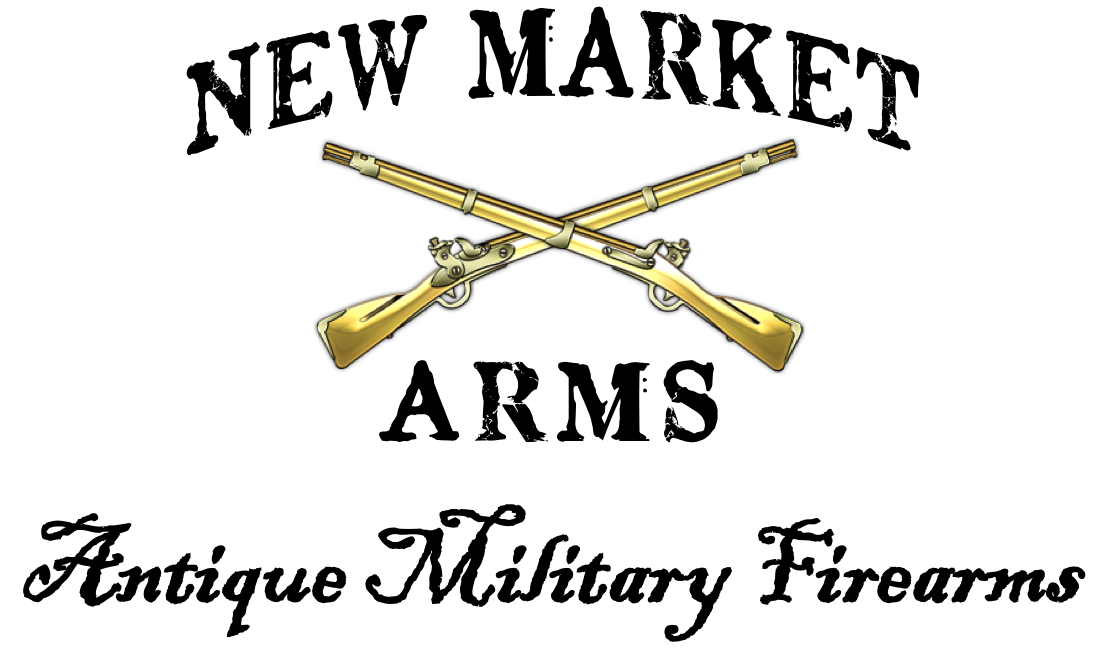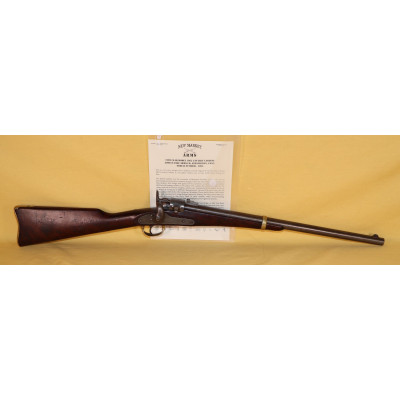Rare Civil War Joslyn Model 1862 Cavalry Carbine
This is a very rare, antique fine condition, and all original Civil War Joslyn Model 1862 Cavalry Carbine in .52 caliber rimfire, one of only 2,400 made during the War.
The Joslyn Carbine was the invention of Benjamin Franklin Joslyn, who was an interesting and innovative weapons designer from the mid-1850s through the Civil War. Roslyn's first design that gained US Government acceptance was his Model 1855 breech-loading carbine in .54 caliber. The carbine did well in tests and the US Army ordered 50 of these weapons, which were manufactured for Joslyn by the A. H. Waters & Company of Milbury, Massachusetts. Around this same time, the US Navy ordered 500 of the rifle version in .58 caliber. These Joslyn Model 1855 Rifles were also manufactured using Joslyn's patent by Waters, but only about 200 were actually delivered to the Navy. Both of these models, while breech-loading firearms, used paper cartridges with standard percussion ignition systems.
Joslyn then designed a modified version of his previous design in 1861 that fired a metal rimfire cartridge. This weapon, which Joslyn now manufactured at his own firm, the Joslyn Fire Arms Company of Stonington, Connecticut, became known as the Joslyn Model 1862 Carbine and approximately 2,400 of these carbines were manufactured during the Civil War.
The Model 1862 Carbine used a hinged breechblock that both secured the cartridge in the breech but also encased the rear breech area. The carbine was loaded by pulling on a locking catch located on the right side of the hinged breechblock and rotating the breech to the left. This particular firearm is the Model 1862 Carbine.
With only 2,400 manufactured, this makes this Model 1862 Cavalry Carbine one of the rarest Union Cavalry Carbines to see service.
Joslyn modified his design slightly in 1863 with several small refinements while retaining much of the original Model 1862 design. This modified design became known as the Model 1862 Transitional Cavalry Carbine, and it incorporated changes which would be included in the Model 1864 Carbine, while retaining some of the original Model 1862 features.
The Transitional Carbine and later Model 1864 Carbine incorporated a new breechblock with a gas escape hole in the event of a ruptured cartridge, and a new breechblock release catch with a knurled outer edge to replace the friction lock. The Model 1864 also used all steel furniture instead of brass, and with the addition of a circular guard around the firing pin extension to protect it. The Model 1864 Carbine was designed to fire either the Spencer .56-52 rimfire cartridge or a unique .54 caliber rimfire cartridge designed and manufactured by Joslyn for its Model 1862 Carbine. Approximately 2,400 Model 1862 Carbines, 1,200 Model 1862 Transitional Carbines, and 12,500 Model 1864 Carbines were manufactured before the Civil War ended. This particular carbine is chambered for the earlier .52 caliber rimfire cartridge.
The Joslyn Model 1862 Carbine was fielded to numerous Union Cavalry Regiments from 1862 to 1865, to include the 1st New York Dragoons (19th NY Cavalry), 4th and 8th Indiana Cavalry Regiments, the 13th Tennessee (Union), the 1st Nebraska, and 2nd Wisconsin.
This Model 1862 Carbine is serial number 1895, matching, and is antique fine condition. The original black walnut stock is in fine condition with what appears to be its original oiled finish. There are normal dings and scratches from field use, but no cracks are noted. There is a period “X” carved on the left side of the butt. The left stock flat has its original and rare inspection cartouches, which are two boxes with script “TKL” initials, which are those of Thomas K. Laley, a former employee of the Harpers Ferry Armory who later became an inspector of contract arms during the Civil War. He is known to have also inspected Merrill, Sharps and Burnside Carbines as well as Ames Model 1840 Swords.
This being an early Joslyn Carbine, it has brass furniture, which did not last long during production before it was switched to iron. The original Model 1862 type brass butt plate is secured with its original iron, convex-head, single-slot screws. The Butt Plate exhibits a nice, burnt mustard patina. The original brass barrel band is present and retains a burnt mustard patina and is secured by the original band spring inset into the bottom, front of the stock, which retains considerable original blued finish. The original cavalry sling bar and sling ring are present with the sling bar secured to the left side of the stock with its original convex, single-slot screws, both of which are only slightly marred.
The trigger plate and trigger guard remain in their brass Model 1862 configuration and exhibit a nice, burnt mustard patina. Both iron, convex, single-slot screws securing the trigger plate to the stock are present. The original steel curved trigger is present, and it still crisply releases the sear when firing.
The lock plate still shows evidence of the original case-hardened finish with the general finish a smooth pewter patina. Just forward of the hammer the lock plate is stamped, "JOSLYN FIRE ARMS Co/ STONINGTON / CONN." The original hammer is secured by its original and early flat, unmarred, single-slot screw and it retains traces of the original oil case-hardened finish. The thumb piece, which is positioned vertically with the hammer down, has the early style crisp checkering comprised of ten alternating lines. The hammer spring is still strong, and the sear still secures the hammer at half-cock and full-cock.
The first style, friction lock, pivoting breechblock has the full serial number, "1895," on the top just below the name and patent information. There is, correctly, no vent hole, which would not be introduced until the Transition Model and later Model 1864 Carbine. The Firing Pin Retaining Screw is present below the serial number. The rear face of the breech-block is correctly unmarked – patent data would not be stamped on the rear face until full Model 1864 production commenced. The top of the breechblock also has the patent data as correctly found on the Model 1862 Carbine, "B. F. JOSLYN'S PATENT / OCTOBER 8th 1861 / JUNE 24th 1862." The flat, single-slot breechblock hinge screw is unmarred. The breechblock friction knob is unmarred and the friction detent and screw remain in place and secure the block correctly. As noted previously, there was no firing pin protective shroud on the Model 1862 or transitional models, but one would be incorporated in the Model 1864 design. The exposed firing pin on this Model 1862 Carbine is unmarred, the interior portion of the rimfire firing pin is in fine condition, and the firing pin spring remains strong. The underside/interior portion of the breechblock still shows traces of its original case-hardened colors. The breech face of the barrel is clear as is the chamber. The barrel tang has the matching serial number "1895" to the rear of the breech, which retains remnants of the original case-hardened finish. The base of the receiver also has the matching serial number “1895” stamp.
The original barrel is the standard 22" length with three grooves, and it exhibits a smooth, pewter patina with traces of its original blued finish in the protected areas. The original sloping fin front sight is present and is still brazed solidly to the barrel, retaining traces of its original blued finish. The original flat crown is present. The bore still has strong rifling with moderate pitting in the lands and grooves with large areas of the lands still shiny. The chamber portion of the barrel remains very clean. On the left side of the barrel, just below the rear sight base, is the serif “TKL” stamp, which is the same Ordnance Department acceptance stamp of Thomas K. Laley as is found on the stock and rear sight base.
The rear sight is the correct two-leaf type with 300-yard and 500-yard leaf that is secured to the barrel with an unmarred spanner head screw. The Rear Sight Base retains generous traces of its original blued finish that has now dulled to a flat blue and pewter patina. The leaf screw has an unmarred slot. There is a serif “1” stamp on the shorter leaf, and serif “3” and “5” stamps for the range on both extended leaves. The original spanner bolt is present and is in very fine condition. The left side of the rear sight base has a serif “TKL” inspection stamp, which are also the initials of final inspector Thomas K. Laley.
This very rare Joslyn Model 1862 Cavalry Carbine is all correct and functions perfectly.
- Item #: Joslyn Model 1862 # 1895
- Availability: In Stock
-
$3,295.00
























































































